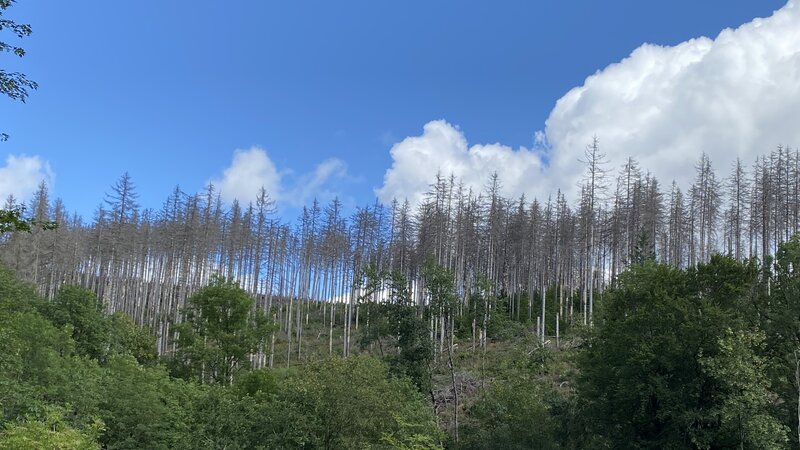Posted on Aug 5, 2023
Climate change threatens Germany's fairy tale forests
427
17
3
6
6
0
Posted 9 mo ago
Responses: 2
PO1 William "Chip" Nagel good day Brother William, always informational and of the most interesting. Thanks for sharing, have a blessed day!
(6)
(0)
PO1 William "Chip" Nagel
SFC Joe S. Davis Jr., MSM, DSL Depressing to Hear How Climate Change is Affecting "The Old Country".
(0)
(0)
PO1 William "Chip" Nagel
..."Salamon is now planting species from the United States, like Douglas fir and red oak – varieties known to withstand both high and low temperatures.
Henrik Hartmann, a scientist whose research with the Max Planck Institute for Biochemistry focused on tree mortality, says blaming the forestry industry is too simplistic and distracts from the real issue of climate change.
Hartmann says Germany's post-war spruce plantations withstood bark beetles for 80 years. He says that, now, increasingly higher temperatures at ever higher elevations are the perfect breeding conditions for beetles, and that drought weakens trees' natural defenses against them.
But he says climate change is killing all species, even those considered indigenous, like oak and beech. "We don't have to go and see spruce trees to see the misery that German forests are facing at the moment," Hartmann says. "If you look up, you will see lots of sky," Hartmann says. "Ten or 12 years ago, we thought that beech is actually our best option for climate change."
But Hartmann says their hopes for beech died along with the trees. "We thought, 'Well, we still have lots of oak, which has a deep rooting system, and oak's going to be our future,'" Hartmann points to the crown of an oak. "If you look up, that doesn't look very much like the future, does it?"
Hartmann is now the head of the Julius Kühn Institute for Forest Protection, established in late 2022 to find ways to save Germany's forest ecosystems. He says he's having to rethink forest preservation methods, because he can't currently predict the type of forest that will need protecting in future.
Forester Andre Salamon says he's relieved to hear scientists are exploring what exactly is killing the trees using their tools – from simulation models to remote sensors. He says that with so many people looking for solutions, he feels his own experiments are not in vain.
And while he also finds it difficult to envisage the future of Germany's forests, he's optimistic there will be trees. "I'm not gonna put a bet on what these woods will look like in a hundred years," Salamon says. "Maybe this will all be palm trees."
..."Salamon is now planting species from the United States, like Douglas fir and red oak – varieties known to withstand both high and low temperatures.
Henrik Hartmann, a scientist whose research with the Max Planck Institute for Biochemistry focused on tree mortality, says blaming the forestry industry is too simplistic and distracts from the real issue of climate change.
Hartmann says Germany's post-war spruce plantations withstood bark beetles for 80 years. He says that, now, increasingly higher temperatures at ever higher elevations are the perfect breeding conditions for beetles, and that drought weakens trees' natural defenses against them.
But he says climate change is killing all species, even those considered indigenous, like oak and beech. "We don't have to go and see spruce trees to see the misery that German forests are facing at the moment," Hartmann says. "If you look up, you will see lots of sky," Hartmann says. "Ten or 12 years ago, we thought that beech is actually our best option for climate change."
But Hartmann says their hopes for beech died along with the trees. "We thought, 'Well, we still have lots of oak, which has a deep rooting system, and oak's going to be our future,'" Hartmann points to the crown of an oak. "If you look up, that doesn't look very much like the future, does it?"
Hartmann is now the head of the Julius Kühn Institute for Forest Protection, established in late 2022 to find ways to save Germany's forest ecosystems. He says he's having to rethink forest preservation methods, because he can't currently predict the type of forest that will need protecting in future.
Forester Andre Salamon says he's relieved to hear scientists are exploring what exactly is killing the trees using their tools – from simulation models to remote sensors. He says that with so many people looking for solutions, he feels his own experiments are not in vain.
And while he also finds it difficult to envisage the future of Germany's forests, he's optimistic there will be trees. "I'm not gonna put a bet on what these woods will look like in a hundred years," Salamon says. "Maybe this will all be palm trees."
(4)
(0)
Read This Next



 Germany
Germany Climate Change
Climate Change Science
Science


